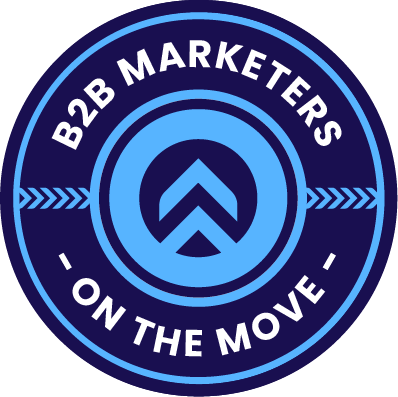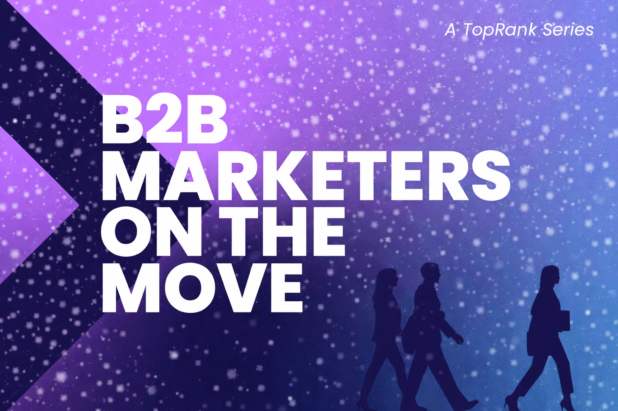The future of AI and work is a hot topic to say the least. According to the 2025 Workforce Skills Forecast from ServiceNow, by 2030, more than 8 million jobs in the U.S. will be impacted by agentic AI. That said, 8 of the 10 countries they studied will have more work than people to do it suggesting the AI and human partnership is more important than ever.
But what about the impact of AI for our world of B2B marketing? In the 2026 B2B Content and Marketing Trends Report from the Content Marketing Institute, Robert Rose says “AI has hijacked the marketing conversation” with their research finding 95% of B2B marketers saying their organizations use AI-powered applications. Most (48%) in a developing stage of implementation and 5% are in an advanced stage.
While the CMI research shows that 89% of B2B marketers are using AI for content, AI adoption in marketing is moving toward deeper integration beyond content creation. CMI found 53% of B2B marketers using AI for creative assets, 41% for SEO, 38% for social media, 36% for email marketing, 35% for research and insights and 16% for ad optimization.
Overall, confidence in AI use for marketing is building. According to The 2025 State of Marketing AI Report from the Marketin AI Institute, 74% of marketers say AI is very or critically important to the success of their marketing.
Growing confidence means increased investment but adoption is not without its challenges. HubSpot’s 2025 AI Trends report reveals that while 98% of organizations plan to increase AI investment in 2025, only 51% of employees are eager to use AI tools.
While there are productivity gains being realized due to AI implementation, the way that many companies are implementing AI is causing some of their best talent to leave. Analysis from Workday in their 2025 Global Workforce report, shows the impact of challenges in AI communication. Nearly half of employee comments about AI and strategy carry a negative tone with employees citing poor communication, uneven adoption, and added pressure.
Our emergence in B2B marketing from the peak of inflated AI expectations into the trough of disillusionment continues and with increased adoption and greater diversity of impact in marketing functions, the “super power” of AI is more easily accessible than ever. Existing foundational models from OpenAI, Anthropic, Meta, Google and others fuel the chat platforms like ChatGPT, Claude, Gemini and myriad AI-enabled and increasingly AI-first or native platforms that are becoming ubiquitous. Without question, this accessibility is having more impact on the skills B2B marketers need to succeed than ever.
All of this begs the question:
When AI is in everyone’s toolbox, how do B2B marketers best differentiate themselves and their brands?
That’s the question I put to some of the top B2B marketing minds I know, including Michael Brenner, Margaret Mollloy, Christpher Penn, and Kathleen Booth who shared their insights:

“Everyone has access to AI so AI can’t set your brand apart. What will? Leaders brave enough to show empathy, share a point of view, and create human connection. Focus on customers value and telling emotional stories.”
Michael Brenner
VP, Thought Leadership & Customer Advocacy at Workday

“Taste. In a world of AI slop, great marketers have great taste. Having great taste is the ability to discern quality, harmony, and originality—whether in words, design, or ideas. It’s about refinement; it’s about recognizing coherence, intention, and emotional resonance. Great taste often reveals itself in simplicity as much as in boldness. It’s the quiet confidence to know when something feels just right, without excess or pretension.”
Margaret Molloy
Founder at Molloy Marketing Advisory

“There are 3 kinds of thinking that will differentiate you in the AI era: critical thinking, creative thinking, and contextual thinking. Whoever has the sharpest insights will win. Whoever has the most, best ideas will win. Whoever has the most, best data will win. If you want to survive, you need 1 out of 3. If you want to thrive, you need 2 out of 3. And if you want to win, you need all 3.”
Christopher Penn
Co-Founder & Chief Data Scientist at Trust Insights

“With AI in everyone’s toolbox, differentiation won’t come from the tools themselves – it will come from how leaders use them. Great marketers won’t just automate faster; they’ll apply human judgment, taste, and empathy to shape what AI produces into something that builds trust and resonance. The edge will belong to those who can balance speed and scale with discernment and creativity – people who know when to lean on AI and when to lean into human insight, storytelling, and community. In the end, technology levels the playing field, but brand, trust, and relationships still win the game.”
Kathleen Booth
Previous SVP of Marketing at Pavilion
(New VP Marketing role Nov 3)
Of course I also reached out to many of the honorees from our Fall 2025 Edition of B2B Marketers on the Move. for their insights as well.

“Early in my career, digital marketing rewarded those who learned faster than everyone else. AI is doing the same, but the real differentiator will always be how we apply human intelligence and imagination to everything it enables. The brands that will lead are those with the experience to use AI in ways that inspire emotion, not just efficiency.”
Josh Mueller
Chief Marketing Officer at Candescent

“AI won’t help marketers differentiate themselves in and of itself. Creating a true value exchange with customers does. It’s amazing how difficult it still is to do. It means exercising influence to ensure that customers’ need for actionable insights consistently comes before the brand’s need to message, and it can be a daily battle. When leadership understands how effective this work is in elevating the brand from vendor to trusted partner, that’s when marketing can achieve true business impact.”
Stephanie Losee
Director, Executive Editor at Salesforce

“The space between innovative creative work and last mile experiential will be dominated by AI-enabled tooling. The differentiated brands will live at those edges, continuing to do amazing visual and design work and delivering immersive 1:1, 1:few, and 1:many experiences while gaining AI-powered efficiency in between.”
Michael Atalla
Chief Marketing Officer at UiPath

“Using AI to create individual pieces of content is a good first step in getting comfortable with the technology. But doing so only scratches the surface of what’s possible. The most effective brands and marketers will differentiate themselves by building AI-powered content pipelines – automated systems that deliver thumb-stopping, on-brand content at scale across audiences, formats, geographies and languages. Setting up content pipelines allows marketers to reach ICPs faster with personalized, relevant content while freeing up their time for the deep work, relationship-building and creative thinking that makes them thrive.”
Steve Kearns
Senior Director, Customer Evangelism & Community-Led Growth at Jasper

“When almost everything can be AI-powered, we can differentiate ourselves by keeping our purpose and process human-engineered—rooted in empathy, wisdom, curiosity, common sense, and good intent. For AI-generated work to result in anything other than sameness, we need to master (not automate) the foundational elements that AI can’t. We have an opportunity to lean into the magic machines can’t make and weave that into the soul of our work:
- Meaning-Making: AI can draft words, but it can’t tell a story with lived experience behind it. The ability to craft narratives rooted in truth, empathy, and perspective will only become more valuable.
- Creative Intuition: AI can remix what already exists, but humans can imagine what doesn’t. The spark that connects insight to true originality—to something no model could predict—is uniquely human.
- Human Connection and Trust: The delight and relief of being seen, heard, or helped by another person who cares is irreplaceable. When we invest in real relationships, both internally and externally, we build the kind of loyalty AI simply can’t manufacture.
AI can make us faster and more efficient, but it has to be layered on top of human-defined foundations to amplify deep thought, authentic purpose, and real expertise. That’s how we can build and scale sustained, stand-out impact.”
Sheri Butts
Sr. Director of Demand Generation at SponsorUnited

“Strive to move your marketing to a thought leadership level. Points of view that are unique, backed up with research and facts that stand out, and 3-4 actions your audience can take.”
Peter Linder
Head of Thought Leadership Americas at Ericsson

“Marketers can differentiate themselves professionally by showing how they use AI and sharpening the skills that AI doesn’t solve for, like demonstrating empathetic leadership, delivering authentic, emotionally compelling narratives, and leading with a growth mindset.”
Meghan Attreed Halaszynski
VP, Content & Communications at Medallia

“As a modern marketer, it’s essential to understand both the benefits and limitations of AI. AI is a powerful and rapidly evolving tool that can bring efficiency, data, analysis, and insight to our roles. However, it doesn’t (and shouldn’t) replace the human intelligence required to develop tailored marketing strategies or tactical roadmaps for execution.
With all marketers now having access to AI, the playing field is level in many respects. But those who will truly stand out are the ones who know how to harness AI for their benefit without becoming dependent on it to create, guide, or direct effective marketing. Human intelligence, ingenuity, and good old-fashioned creativity are more essential than ever at a time when so many are leaning heavily on AI-generated output. In addition, marketers at every level should embrace a growth mindset, continually learning, improving, and upskilling their own personal marketing playbook.
Ultimately, knowing when, where, and how to leverage AI has become a crucial skill, and those who will differentiate themselves are the ones who strike the right balance, allowing their own intelligence to lead the way.”
Tim Asimos
Chief Marketing Officer at Timmons Group

“When everyone has access to AI, the edge comes from how you think, not what tools you use. AI can speed execution, but it can’t replicate judgment, personality or instinct. The best marketers will use it to expand their creativity, not outsource it.”
Heather Cmiel
Vice President, Marketing and Communications at Rad AI

“AI is just another tool in your kit, and like with any craftsman, it’s all in how you use it and that’s where the differentiation comes in. It’s about how strategic you are about applying it to understand your target audience better, engage that audience deeper or in new ways, and monetize your efforts across ads, content, and experiences.”
Josh Peters
Vice President, Global Data Partnerships and Strategy at Bombora
The opportunity to differentiate is human
In the end, the age of AI in B2B marketing is about moving past the idea that machines are replacing marketers and towards the understanding that the true value of AI adoption is about amplifying what makes us distinctly human. As the insights shared here make clear, the differentiators that matter most: empathy, taste, judgment, creativity, and trust, can’t be automated.
As I’ve said before,
AI tools make people more of what they are. Brilliance or mediocrity at scale really depends on the person and their ability to use AI as a tool.
AI can scale our ideas, speed our execution, and sharpen our insights, but it’s our ability to apply discernment, imagination, and purpose that will define the B2B marketers and brands that drive impact and growth as we enter 2026 and beyond. Whether your B2B brand is associated with AI-driven mediocrity or human inspired brilliance depends on credibility, distinctive ideas and quality of content and engagement. These are all qualities of research-based, full funnel thought leadership marketing that helps brands cut through the noise.
The opportunities of the future in B2B marketing belong to those leaders who can master the tools of AI while at the same time, lean in to the things that make creativity, communications, and connections uniquely human.
Of course we’ve covered the Human + AI topic before on the Beyond B2B Marketing podcast in this episode, Human + AI = B2B Marketing ROI with our Christiana Marouchos from StackAdapt. (client)
If you’d like to learn more about optimizing the best of human and AI capabilities to drive full funnel thought leadership content centered around original research, contact TopRank Marketing here.




